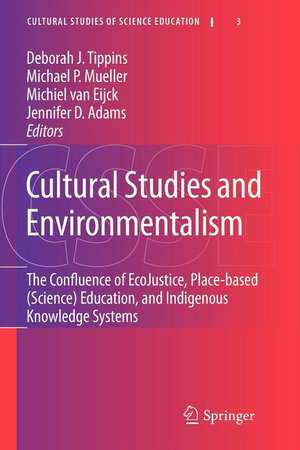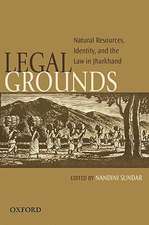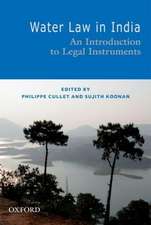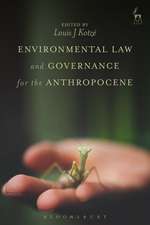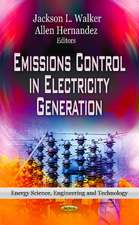Cultural Studies and Environmentalism: The Confluence of EcoJustice, Place-based (Science) Education, and Indigenous Knowledge Systems: Cultural Studies of Science Education, cartea 3
Editat de Deborah J. Tippins, Michael P. Mueller, Michiel van Eijck, Jennifer D Adamsen Limba Engleză Paperback – 13 oct 2012
| Toate formatele și edițiile | Preț | Express |
|---|---|---|
| Paperback (1) | 1227.52 lei 6-8 săpt. | |
| SPRINGER NETHERLANDS – 13 oct 2012 | 1227.52 lei 6-8 săpt. | |
| Hardback (1) | 1233.69 lei 6-8 săpt. | |
| SPRINGER NETHERLANDS – 18 aug 2010 | 1233.69 lei 6-8 săpt. |
Din seria Cultural Studies of Science Education
- 15%
 Preț: 654.30 lei
Preț: 654.30 lei - 18%
 Preț: 949.73 lei
Preț: 949.73 lei -
 Preț: 388.34 lei
Preț: 388.34 lei - 18%
 Preț: 784.30 lei
Preț: 784.30 lei - 15%
 Preț: 647.27 lei
Preț: 647.27 lei - 18%
 Preț: 910.10 lei
Preț: 910.10 lei - 15%
 Preț: 642.83 lei
Preț: 642.83 lei - 15%
 Preț: 646.62 lei
Preț: 646.62 lei - 18%
 Preț: 895.58 lei
Preț: 895.58 lei - 18%
 Preț: 731.10 lei
Preț: 731.10 lei - 18%
 Preț: 782.24 lei
Preț: 782.24 lei - 18%
 Preț: 949.10 lei
Preț: 949.10 lei - 15%
 Preț: 637.13 lei
Preț: 637.13 lei - 15%
 Preț: 635.96 lei
Preț: 635.96 lei - 18%
 Preț: 949.10 lei
Preț: 949.10 lei - 15%
 Preț: 643.65 lei
Preț: 643.65 lei - 15%
 Preț: 645.28 lei
Preț: 645.28 lei - 15%
 Preț: 651.84 lei
Preț: 651.84 lei - 15%
 Preț: 663.79 lei
Preț: 663.79 lei
Preț: 1227.52 lei
Preț vechi: 1496.99 lei
-18% Nou
Puncte Express: 1841
Preț estimativ în valută:
234.88€ • 245.24$ • 194.40£
234.88€ • 245.24$ • 194.40£
Carte tipărită la comandă
Livrare economică 05-19 aprilie
Preluare comenzi: 021 569.72.76
Specificații
ISBN-13: 9789400732995
ISBN-10: 9400732996
Pagini: 524
Ilustrații: XXVIII, 496 p.
Dimensiuni: 155 x 235 x 28 mm
Greutate: 0.73 kg
Ediția:2010
Editura: SPRINGER NETHERLANDS
Colecția Springer
Seria Cultural Studies of Science Education
Locul publicării:Dordrecht, Netherlands
ISBN-10: 9400732996
Pagini: 524
Ilustrații: XXVIII, 496 p.
Dimensiuni: 155 x 235 x 28 mm
Greutate: 0.73 kg
Ediția:2010
Editura: SPRINGER NETHERLANDS
Colecția Springer
Seria Cultural Studies of Science Education
Locul publicării:Dordrecht, Netherlands
Public țintă
ResearchCuprins
EcoJustice.- The Need for Confluence: Why a “River” Runs Through It.- Nurturing Morally Defensible Environmentalism.- EcoJustice Education for Science Educators.- Toward Awakening Consciousness: A Response to EcoJustice Education and Science Education.- Invoking the Sacred: Reflections on the Implications of EcoJustice for Science Education.- Local Matters, EcoJustice, and Community.- Engaging the Environment: Relationships of Demography, EcoJustice, and Science Teacher Education in Response to Wolff-Michael Roth.- Moral–Ethical Character and Science Education: EcoJustice Ethics Through Socioscientific Issues (SSI).- What’s Wrong with Genetic Engineering? Ethics, Socioscientific Issues, and Education.- Action-Based Science Instruction: Service-Learning, Stewardship, and Civic Involvement.- Developing a Sustainable Agricultural Curriculum in Malawi: Reconciling a Colonial Legacy with Indigenous Knowledge and Practices.- When Elephants Fight, It Is the Grass That Suffers.- Working for Change: Reflections on the Issue of Sustainability and Social Change.- Questions for Copenhagen: EcoJustice Perspectives and Summary.- Place-Based (Science) Education.- Place-Based (Science) Education: Something Is Happening Here.- Educating-Within-Place: Care, Citizen Science, and EcoJustice.- Invoking the Ontological Realm of Place: A Dialogic Response.- A Case Study of David, a Native Hawaiian Science Teacher: Cultural Historical Activity Theory and Implications for Teacher Education.- Deconstructing Chinn and Hana’ike: Pedagogy Through an Indigenous Lens.- Critical Pedagogy of Place: A Framework for Understanding Relationships Between People in (Contested) Shared Places.- River Advocacy: Valuing Complex Systems as the Groundwork for River Relationships.- Bringing the Invisibleto Light: Art as Places for Advocacy.- River Advocacy as a Case of/for Novelizing Discourse in Science Education.- Implications of Sense of Place and Place-Based Education for Ecological Integrity and Cultural Sustainability in Diverse Places.- Responding to Place.- Envisioning Polysemicity: Generating Insights into the Complexity of Place-Based Research Within Contested Spaces.- Place-Based Education as a Call from/for Action.- Indigenous Knowledge Systems.- One Hundred Ways to Use a Coconut.- Traditional Ecological Knowledge, Border Theory and Justice.- Considering the Consequences of Hybridity: Protecting Traditional Ecological Knowledge from Predation.- On Critical Thinking, Indigenous Knowledge and Raisins Floating in Soda Water.- Rethinking Models of Collaboration in Critical Pedagogy: A Response to Stonebanks.- “What Is Ours and What Is Not Ours?”: Inclusive Imaginings of Contextualised Mathematics Teacher Education.- Responding to Glocalisation and Foundationalism in Science and Math.- Australian Torres Strait Islander Students Negotiate Learning Secondary School Science in Standard Australian English: A Tentative Case for Also Teaching and Assessing in Creole.- Are We Creating the Achievement Gap? Examining How Deficit Mentalities Influence Indigenous Science Curriculum Choices.- Indigenous Stories: Knowledge Is Sometimes Where You Least Expect to Find It.- Ways to a Waterhole.- Ecodemocracy and School Science: How Projects of Confluence Guide the Development of the Ecosociocultural.
Textul de pe ultima copertă
As the first book to explore the confluence of three emerging yet critical fields of study, this work sets an exacting standard. The editors’ aim was to produce the most authoritative guide for ecojustice, place-based education, and indigenous knowledge in education. Aimed at a wide audience that includes, but is not restricted to, science educators and policymakers, Cultural Studies and Environmentalism starts from the premise that schooling is a small part of the larger educational domain in which we live and learn. Informed by this overarching notion, the book opens up ways in which home-grown talents, narratives, and knowledge can be developed, and eco-region awareness and global relationships can be facilitated. Incorporating a diversity of perspectives that include photography, poetry and visual art, the work provides a nuanced lens for evaluating educational problems and community conditions while protecting and conserving the most threatened and vulnerable narratives. Editors and contributors share the view that the impending loss of these narratives should be discussed much more widely than is currently the case, and that both teachers and children can take on some of the responsibility for their preservation.The relevance of ecojustice to this process is clear. Ecojustice philosophy is a way of learning about how we frame, or perceive, the world around us—and why that matters. Although it is not synonymous with social or environmental justice, the priorities of ecojustice span the globe in the same way. It incorporates a deep recognition of the appropriateness and significance of learning from place-based experiences and indigenous knowledge systems rather than depending on some urgent “ecological crises” to advocate for school and societal change. With a multiplicity of diverse voices coming together to explore its key themes, this book is an important starting point for educators in many arenas. It brings into better focus a vital role for theEarth’s ecosystems in the context of ecosociocultural theory and participatory democracy alike.“Encompassing theoretical, empirical, and experiential standpoints concerning place-based knowledge systems, this unique book argues for a transformation of (science) education’s intellectual tradition of thinking that emphasizes individual cognition. In its place, the book offers a wisdom tradition of thinking, living, and being that emphasizes community survival in harmony within itself and with Mother Earth.” Glen Aikenhead
Caracteristici
Only book that creates a confluence between ecojustice ethics and decision-making Pertinent to course development for both environmental and science education Clearly lays out the commonalities between ecojustice, place-based, and indigenous knowledge Supports new visions and research directions for 21st century schooling
